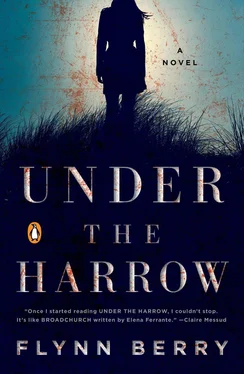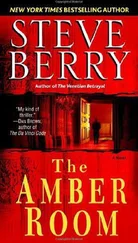I can hardly bear to sit still. It’s not like something that happened days ago, it’s always about to happen, he’s always coming up the hill.
The doors to A&E open and Joanna spots me and waves. She wears a white doctor’s coat over a black suit. We’ve met only a few times, but Rachel often spoke about her. Joanna crosses her legs and leans against the bench. The red Casualty sign glows above the entrance.
“Have they arrested anyone yet?” she asks.
“No.”
“I keep thinking about what I’d do to him if I found him,” says Joanna. “It wouldn’t be quick.”
She’s from Manchester, and her accent is familiar and reassuring, not quite like Rachel’s but at least northern. She is over forty and Rachel once said she looked at Joanna to see what she would be like in ten years. “But she’s a doctor, not a nurse,” I said, and Rachel gave me a long stare.
“Is there anyone on staff named Martin?”
Joanna frowns. “Not in our unit, no.”
“A patient?”
“No one comes to mind. Why?”
“She mentioned the name for the first time recently. She said she was going to meet him.”
“I’ll let you know if I think of anything,” she says.
“How had she seemed lately?”
“She was herself.” Joanna stares at the hospital. “It’s terrible without her. Everyone else in there is a tosser or a moron.”
“What about Helen?”
“Tosser.”
In ten years Rachel would have been a senior nurse practitioner. I wonder if she would have stayed in Oxford or left for another hospital.
“We got pissed a few weeks ago. I told Rachel about the affair I’m having and she told me about getting beat up when she was seventeen.”
“She never told anyone that. I don’t think she ever told Stephen.”
“We were friends,” says Joanna, drawing out the last word.
“Where were you?” I want to be able to picture the two of them. It makes me happy. Sometimes I worried that Rachel was lonely, that all she did was work.
“The Pelican.”
Joanna sighs. I imagine she feels as I do, which is leaden. A plane roars overhead, hidden in the seam of the clouds.
“Why did you go to the Pelican?”
After work, Rachel only ever went to the White Hart, near the hospital.
“Rachel came to meet me after her shift. I was already in Oxford,” she says.
“Why?”
“A coroner’s inquest.”
“When was this?”
“October.”
“That must have been difficult.”
“No, I’ve been at dozens of them. We do an inquest every time someone dies within forty-eight hours of entering hospital. The coroner talks to the witnesses and presents the cause of death, and then if we’re lucky we have the afternoon off.”
I ask about her affair, because I want to build out the image of the two of them in the Pelican. The affair is with her son’s swimming instructor. I make her tell me Rachel’s reaction. Joanna says there was a lot about it the two of them found hilarious at the time, and I see Rachel, hanging her dark head and laughing over the table.
• • •
Four old men are playing shuffleboard at the public courts when I return to Marlow. When it was too cold for me, Rachel played with the regulars. She didn’t know all their names and said they rarely talked, but when one of them went on holiday he brought her a small bottle of ouzo.
“Why did he get you ouzo?” I asked.
“Because he went to Greece,” she said.
I wonder if one of these men brought Rachel the ouzo. They appear to be in their eighties, so I rule them out of suspicion. It’s not fair, really. Who knows what they were like when they were younger.
I watch them push the burgundy disks down the court and wonder whether they knew her, and how well. I remember how embarrassed Lewis was for me on the common last week. Rachel never told me about visiting Andrew Healy in prison. She never told me she bought the dog for protection. She allowed me to pretend it was over.
I COME OUT OF the grocer’s on the high street with two carrier bags. Part of my arrangement with the manager now is that I have full use of the kitchen. There are flurries but it feels too cold for snow. I shift the straining bags to my other hand. At the door to the inn, I turn around and, as I expected, Keith is standing beside his van watching me.
I was behind him on the checkout line. It was quite a slow line, too. He seemed to grow more and more distraught, but he couldn’t exactly leave at the sight of me, at least not in front of other people. The thing is, Rachel and I look similar.
• • •
I resume my research, hunched over my laptop on the bed, working through a bag of licorice. I add more names to the list and sort through them, striking names if they were in prison on the date of either her assault or her murder, adding stars to indicate priority, and then, hours into the research, I find Paul Wheeler.
It took me so long because he was charged six years ago, and there’s been nothing about him in the news since. He attacked a young woman at seven in the morning in Bramley, a district in Leeds. As soon as I read the first sentence of the article, my skin starts to burn.
Seeing the photograph of him is like remembering a name you’ve forgotten, as though I knew it was him all along. He looks exactly as she described.
I lurch off the bed and drink water straight from the tap. I want to call Rachel so much that I pick up my phone and find her name, allowing myself a few seconds with the illusion that I might be able to tell her.
The assault matches what happened to Rachel. The victim was a stranger, the attack brutal and sudden. After another two hours of research, I have the name of the victim, the town where Paul lived, and the name of his solicitor. He was tried at York Crown Court and imprisoned at Wakefield. I call his solicitor and leave a message with my number, asking Paul to contact me. I say my name is Sarah Collier, from the Telegraph . A few hours later, my phone rings.
• • •
We arranged to meet at a café in Leeds. I am surprised that he is willing to talk to me, though he has nothing to lose. He has already served time for the assault in Bramley. If his case hadn’t yet gone to trial, or if he were still in prison awaiting parole, he would never agree to meet me.
His hair has been shaved. Before, in the arrest photographs, he wore it long. He hasn’t seen me yet and I step back into the entry. I can’t go near him when I’m like this, and I force myself to wait outside for another few minutes. He is on parole. I know the conditions of his parole and what will happen if he violates them.
He smiles when he sees me. It’s him. I’m certain of it. There is a glass jar of sugar on the table, and I want to break it in half on the edge of the chair and drive it into his face.
“Hello, Paul. Thank you for meeting me.” I imitate Sarah Collier. I speak in a brisk voice, as she does, and my movements are firm and decisive. After my coffee arrives, I tap my spoon once on the side of the cup and set it beside my saucer. “I’m working on a story for the Telegraph and it concerns you. I think there was a miscarriage of justice in your trial.”
It takes a great deal of effort to speak clearly and sound neutral. If I stop controlling my face for a second, it will break apart, and I will tell him how I plan to punish him.
He stares back at me, amused, and I think the disguise hasn’t convinced him, but he probably does this to all women — journalists, prosecutors, judges — a stripping-down, an assessment. Their reserve and competence don’t fool him. He knows what they’re like. He knows what they look and sound like when they’re scared.
Читать дальше












